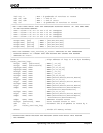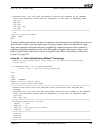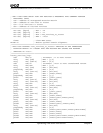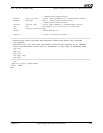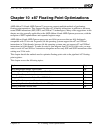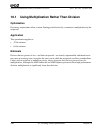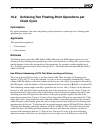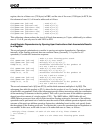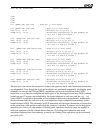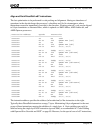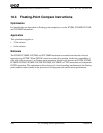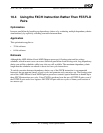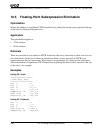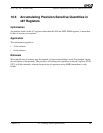
240 x87 Floating-Point Optimizations Chapter 10
25112 Rev. 3.06 September 2005
Software Optimization Guide for AMD64 Processors
register, the size of three rows (720 bytes) in EBX, and the size of five rows (1200 bytes) in ECX, the
first element of rows 0–5 of A can be addressed as follows:
fld QWORD PTR [edi-128] ; Load A[i,0].
fld QWORD PTR [edi+eax-128] ; Load A[i+1,0].
fld QWORD PTR [edi+eax*2-128] ; Load A[i+2,0].
fld QWORD PTR [edi+ebx-128] ; Load A[i+3,0].
fld QWORD PTR [edi+eax*4-128] ; Load A[i+4,0].
fld QWORD PTR [edi+ecx-128] ; Load A[i+5,0].
This addressing scheme reduces the size of all loads from memory to 3 bytes; additionally, to address
rows 6–11 of A, you only need to add 240*6 to EDI.
Avoid Register Dependencies by Spacing Apart Instructions that Accumulate Results
in a Register
The second general optimization to consider is spacing out register dependencies. Operations
internally in the floating-point unit have an execution latency (normally 3–4 cycles for x87
operations). Consider this instruction sequence:
fldz ; Push 0.0 onto floating-point stack.
fld QWORD PTR [edi-128] ; Push A[i,0] onto stack.
fmul QWORD PTR [esi-128] ; Multiply A[i,0] by B[0,j].
faddp st(1), st(0) ; Accumulate contribution to dot product of
; A’s row i and B’s column j.
fld QWORD PTR [edi-120] ; Push A[i,1] onto stack.
fmul QWORD PTR [esi-120] ; Multiply A[i,1] by B[1,j].
faddp st(1), st(0) ; Accumulate contribution to dot product of
; A’s row i and B’s column j.
fld QWORD PTR [edi-112] ; Push A[i,2] onto stack.
fmul QWORD PTR [esi-112] ; Multiply A[i,2] by B[2,j].
faddp st(1), st(0) ; Accumulate contribution to dot product of
; A’s row i and B’s column j.
The second statement loads A[0] into ST(0), and the third statement multiplies it by B[0]. The
subsequent line adds this product to ST(1), where the dot product of row 0 of matrix A and column 0
of matrix B is accumulated. Each of the subsequent groups of three instructions adds the contribution
of the remaining 29 elements to the dot product. This code is poor because all the addition operations
depend upon the contents of a single register, ST(1). The AMD Athlon, AMD Athlon 64 and
AMD Opteron processors have out-of-order-execution floating-point units, but none of the addition
operations can be performed out of order because the result of each addition operation depends on the
outcome of the previous addition operation. Instruction scheduling based on this code greatly limits
the throughput of the floating-point unit. To alleviate this, space out operations that are dependent on
one another. In this case, work with six rows of A rather than one at a time, as follows:
; Multiply first element of each of six rows of A by first element of
; B’s column j.
fldz ; Push 0.0 six times onto floating-point stack.
fldz



